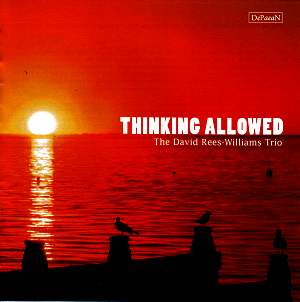1. Two-part Invention in A minor (Bach)
2. Choral in A minor (Cesar Franck)
3. Theme from Sonata in A major (Mozart)
4. Prelude No. 10 in E minor (Bach)
5. Fugue No. 10 in E minor (Bach)
6. Arietta Op. 12 No. 1 (Grieg)
7. Sonata in D minor (Scarlatti)
8. Adagio from Sonata in A minor (Vivaldi)
9. St. Patrick (Ancient Irish Hymn melody)
10. Sonatine 3rd
Movement (Ravel)
11. Passepied (Debussy)
12. Two-part Invention in A minor (Bach) – Take
2
David Rees-Williams – Piano, Hammond RT3, keyboards
Neil Francis – Fretless electric bass
Phil Laslett – Drums
Jacques
Loussier may have done it first but David
Rees-Williams does it better. Loussier popularised
the idea of playing jazz versions of classical
pieces – starting with Bach and then moving
on to other composers. But in fact there has
been a long tradition of "Jazzing the
Classics", going back at least to the
1930s with such things as Tommy Dorsey’s Song
of India (thanks to Rimsky-Korsakov) and
John Kirby’s version of Grieg’s Anitra’s
Dance.
In
fact David Rees-Williams is more respectful
of his material than some of those earlier
essays in jazzing the classics. David doesn’t
subject them to "jazzing up" but
he uses them as vehicles for jazz improvisation
which tries to maintain the spirit of each
composer. I was first alerted to the David
Rees-Williams Trio by his previous album Time
Scape, which included a particularly fine
reading of Stanford’s beautiful Magnificat
in G.
On
this new CD, David transmutes a dozen classical
pieces, generally stating the theme before
launching into improvisation with a jazz rhythm,
aided by the sterling work of bassist Neil
Francis and drummer Phil Laslett. David’s
excursions are mostly more adventurous than
Jacques Loussier’s. He plays the first Bach
piece fairly straight but the Cesar Franck
Choral allows the drummer to really
let rip at an exhilarating tempo. This track
also introduces David playing the Hammond
organ as well as the piano – and on several
tracks he overdubs organ or other keyboards
which add to the palette of sounds but sometimes
diminish the delicacy of the performances.
In some ways I preferred the simple clarity
of the previous album, which just used the
piano trio.
However,
this trio continually presents us with startlingly
new perspectives on old compositions, without
making fun of the composers. They capture
the romanticism of Grieg as well as the implicit
lyricism of Bach and the playfulness of Mozart
(in the theme from his Sonata in A major,
which shifts between three-four and four-four).
And they make Debussy’s Passepied a
shuffling Latin-American delight, with swing
extemporization in the middle.
These
three fine musicians are based in Canterbury,
Kent, but it is to be hoped that this CD and
their previous albums will make them much
more widely known. They certainly deserve
it.
Tony Augarde
